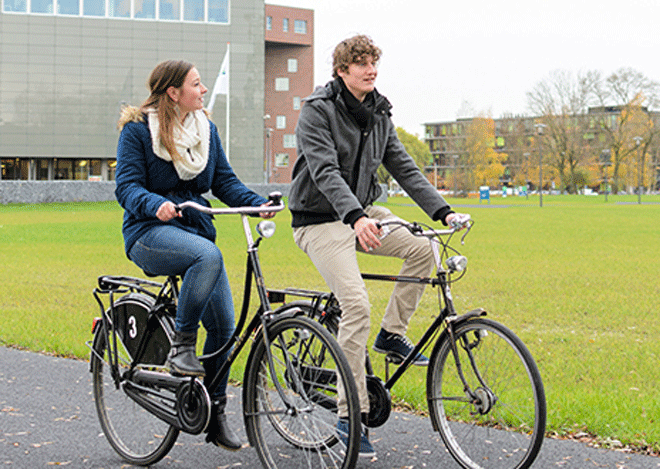Preventing study stress. How?
It’s very important to prevent study stress because if you have a burnout as a student, it’s difficult to recover. I spoke with Jolanda Qualm, student dean at VHL University of Applied Sciences. In this article, she gives tips for students and their parents about preventing study stress. (Dutch version, in het Nederlands)

Preventing study stress also means: look for healthy relaxation, live healthily, take a rest now and again
What does a student dean do?
A student dean is there to help students with problems other than those related to their actual programme. The student dean gives confidential advice and guidance. You can contact the student dean if you have questions about studying with a handicap, financial issues, problems within or outside of your programme or if you just don’t feel comfortable. ‘Many of the students who come to us do so because they have too little vitality and energy because of stress. Preventing study stress is very important,’ said student dean Jolanda Qualm.
Studying vitally
‘The essence of studying vitally is to remain close to yourself. The core of learning is to ask yourself questions; as a student and as a person, you should be curious. Learning has to be part of yourself. You should see a study programme as a playground with various pieces of equipment. You have to discover which playground equipment you enjoy most and which ones suit you the best.’
Study programme as a playground
‘When you enter a playground, you can be overwhelmed by the large choice of equipment. It’s important to discover exactly which equipment you enjoy the most and that challenges you. But also … equipment that fits your capacities, because some simply don’t suit you, you don’t enjoy them, or they’re too difficult…’

Preventing study stress is very important, said student dean Jolanda.
Structure of the study programme
‘A study programme works in the same way. You have the basic material, especially in the first year, but you later discover other possibilities. You’ll gradually discover subjects that suit you, that stimulate your desire to learn, things that make you curious. And curiosity is the basis of learning. Of course, not all subjects will appeal to a student. It’s essential for the student to discover where his or her real passion lies. Those are the subjects that are the most useful to him or her, that become part of the student. This is often not more than 20% of the programme, but it can be the motor for completing the programme. It gives vitality and energy. A programme of studies is just a ‘frame’, a ‘mould’ into which you can put subjects that interest and challenge you.’
Free choice
‘I think that free choice in a programme of studies is important. But it’s quite a process to choose the right subjects. Of course you have help, for example from the study development counsellor, but still… Preventing study stress also means ‘choosing what suits you best’.
Pressure to achieve
‘Unfortunately, I see in my work that today’s students experience an enormous pressure to achieve. In their minds, the choices they make must immediately be the right ones. And of course that’s impossible. Failing an exam is all part of the process. It doesn’t have to be right the very first time.
Students sometimes find it hard to prevent study stress. They make high demands of themselves. They think that they have to be a successful student and have a part-time job and be active in a student club and stay in touch with old and new friends and last but not least… meet their parents’ expectations. Regulations for student loans and debts make everything extra tense. That’s just much too much.’
Tips for parents
‘Is your son or daughter still at secondary school? Talk with them about the transition from school to studying. A student has a lot of responsibility. As a parent, show that you’re involved but don’t take their responsibility away from them. Students have to find their own way. But it’s important that you as a parent stay in contact with your child.’
Live healthily
‘Try to stimulate your son or daughter to live healthily. Even though they’re young… living unhealthily with a lot of stress can diminish a person’s resistance. Within a year’s time, such a student can’t cope with the stress, they develop anxieties, they can have a burnout or a complete blackout for certain parts of the study programme. Preventing study stress is the best medicine, and as a parent you can help.
Live healthily, eat healthily, play sports, look for relaxation, stay active… teach all these things to your child, or at least discuss them.’
Look at your child
‘Sometimes I ask a student who’s very depressed what he or she talks about with their parents. And I often hear: I don’t tell my parents anything, I don’t want to make them unhappy. That’s sweet of them, but this attitude only drives parents and students apart, whereas a depressed student can benefit from parents who are involved.
As student deans we aren’t allowed to contact parents. That has been so regulated in the Privacy Act. Even if a student is younger than 18, we have to consider him or her an adult. So unfortunately, we can’t give you parents a sign if we see that something is going wrong.
So… My tip to parents: Take a good look at your child. Does he or she appear well-groomed? Are they happy inside? Relaxed?
Preventing study stress
‘Yoga or meditation are also ways of preventing study stress. These are given at many universities and universities of applied science. And students can often follow these courses at the sports centre.’
Jolanda Qualm, student dean at VHL University of Applied Sciences.

